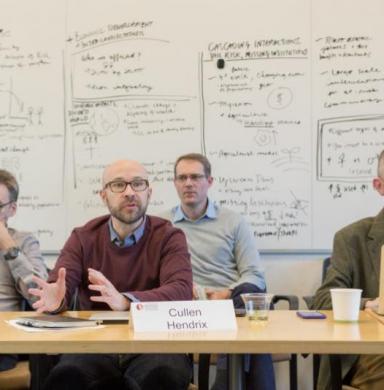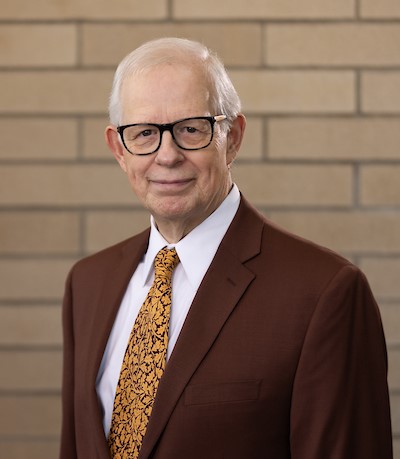Environmental Sustainability
Combating climate change
Climate change may be the most important long-term threat facing humanity with potentially profound implications for security, social justice, economic inequality and democratic governance. Is environmental sustainability achievable for this and future generations?
Professor Cullen Hendrix, a member of the UN’s Intergovernmental Panel on Climate Change, addresses the ways in which climate change interacts with conflict on a global scale. In collaboration with the Korbel School’s Pardee Center for International Futures, students have the opportunity to model future-focused scenarios that depict a world altered by climate change. Students in our new MA program in Global Environmental Sustainability can engage the unrivaled resources of the Denver area, home to the largest concentration of federal labs and agencies, environmental NGOs, and energy businesses in the country.
Selected Courses
INTS 4909
Climate Justice
About this Course
The science of climate change, while continuing to become more exact and nuanced, is clear – human behavior has caused the planet to warm unnaturally. Now that the science has been established the next question is how will it affect the ecosystem and, especially human habitation. As seems to be the norm, those most affected by climate change will be the poor, the disempowered, and native populations. The understanding and the possible solutions must be interdisciplinary – human rights, law, economics, development, gender and race equity, security, science – to name a few. The course will look at the history and philosophy of climate justice, which includes such disciplines as environmental justice and sustainability, move through an analysis via a number of different viewpoints, and conclude with a look into the future in terms of education and activism. Climate justice requires a sharp, critical look at systems and an understanding of the interconnectedness of science, ethics, and politics. Examples of this might include the rising of sea levels displacing very large numbers of people adding to the already impossible strain on refugee and IDP resettlement. Or the Brazilian economy’s almost sole reliance on hydro-electric power in face of the drying up of rivers and water basins. Or the role of the world’s religions and religious leaders in climate justice. One of the unique characteristics of this course will be the number of guest lecturers. It is incumbent on universities and colleges to take a multi-disciplinary approach to climate justice and lower the “silos” between academic units. To that end colleagues from DU and other institutions will bring their disciplines and insights to bear on the topic.
INTS 4566
Global and Sustainable Development (Case of Coffee & Chocolate)
About this Course
In recent years, the issue of sustainable development has received considerable attention from academia, governments, and international organizations. Of particular concern are countries that are heavily dependent on the export of commodities. Can sustainable development be achieved by such countries? Chocolate (cocoa) and coffee are not only among the world's most popular little pleasures, they are also among the most traded commodities. Originating in Latin America and Africa respectively, their global diffusion has influenced the culture, society and politics of developed and developing countries for decades and continues to do so today. Coffee exports (the primary source of foreign exchange for many poor countries such as Ethiopia) are valued at about 9 billion annually. 25 million people in Asia, Latin America, and Africa struggle to earn a living through coffee production, it too is a major source of income for many countries in Latin America and West Africa. Yet, many problems have been identified such as farmers unable to earn a survival wage, the exploitation of child labor, and the damage that production processes inflict upon the environment. In short, these important commodities are apparently contributing little to sustainable development. Various organizations and individuals are involved in efforts to change this situation by promoting the establishment of specialty, organic and fair trade coffee and chocolate products. The degree to which these efforts can help turn the existing situation around remains unclear but the lives of millions of people and the future of many countries hangs in the balance. This seminar is designed to address such issues. We explore the meaning of sustainable development and consider the nature of globalization and the ways in which it has shaped the cultivation and consumption of coffee and chocolate over time. In order to understand this linkage, we utilize the concept of the "commodity chain", an approach that allows us to conceptualize the nature of the international linkages, their key nodes, the distribution of power, and the ways in which external factors influence a country's development efforts. The course is divided into three parts. In the first, we cover the basic concepts and seek to answer such questions as: 1) How have the coffee and cocoa commodity chains been shaped by globalization? 2) What has been the role of key actors - producers, local traders, governments, and multinational corporations - in shaping production and consumption patterns over time? In the second part we consider three basic forces that have shaped the commodity chains - the state and its policies, culture and consumption patterns, and entrepreneurs and technology. Here the questions are: 1) How have the policies of producing and consuming states affected the commodity chains? 2) How have changes in consumption patterns reflected in the growth of Starbucks influenced the situation in developing countries? 3) How have external technologies such as transportation and communication technologies as well as internal technologies such as instant coffee changed the chains?
INTS 4965
Technology and Sustainable Development
About this Course
Technology has always been a major influence on cultures and societies, national and international. Today, all countries recognize the key role that technology plays in achieving sustainable development and are striving to harness its potential while minimizing its negative impacts. New technologies such as robotics, genetics, information and communication all promise transformations that can greatly improve the quality of life of peoples everywhere. At the same, time they can also develop in ways that do not lead to as sustainable a future. Thus, they generate controversy and difficult policy choices for governments and peoples everywhere. Accordingly, it is essential to understand the nature of technology and its role in social and political change as well as the ways in which it can be controlled and harnessed for positive ends. In this seminar we will focus upon the relationship of technology to sustainable development and pay special attention to emerging technologies and to such issues as technology transfer, the relationship between technology and democracy, technology assessment and control, the role of appropriate technology, and how developing countries can develop modern scientific and technological capabilities that promote sustainable futures.
Related News Stories

Exploring the Link Between Climate Change and Armed Conflict
Conflict and climate change have been linked for decades, with Pentagon-commissioned studies predicting a range of dark scenarios — from shooting wars in South Asia and civil war in China to the breakup of the European Union.




